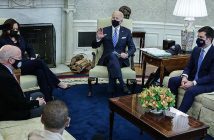by Manoj Ladwa
If the ongoing turf wars between the three ministers in charge of delivering Brexit is anything to go by, the UK is yet to get its act fully together.
Liam Fox, who took charge as minister for international trade in the Theresa May led government recently, will be off to India early next week. While he will be glad to leave behind some of the school playground bickering that is rumoured to be going on between him, new Brexit minister David Davis and foreign minister Boris Johnson, India will be keen to see what new he has on offer for a post-Brexit India-UK partnership.
He lands close on the heels of another UK minister, Priti Patel, who was welcomed back in her new avatar as minister for international development by Prime Minister Modi as well as finance minister Arun Jaitley and external affairs minister Sushma Swaraj earlier this month. Her high-profile meetings with the ‘Big Three’ during her whirlwind tour reflect the goodwill she currently enjoys with the Indian establishment.
![]()
Fox, on the other hand, is a relative newcomer and will be starting from scratch. This could well prove useful in charting out a whole new chapter in the UK’s much-talked-about special relationship with India. It is however not the high-profile visits that have been missing from this “special” engagement but more concrete agreements and deals. India has been in listening mode ever since David Cameron led his now fabled largest-ever business delegation in 2010. Now, as the world shifts gears to see what Britain without a European Union (EU) membership has to offer, it is time the tone and tenor of the India-UK relationship also makes a dramatic shift.
Can Fox offer a more substantive assurance on the rights of highly-skilled migrants from India? Can he prove immigration policies are really not intended to block out bright Indian students from UK universities, as the falling numbers would suggest? Can we look beyond the obvious and strike some truly groundbreaking pacts such as utilising India’s medical and pharmaceutical research capabilities? Can the UK and India strike a strategic partnership in defence and homeland security technologies – where technology and trust must go hand in hand?
All these are just a few examples of what a truly win-win partnership could look like in the wake of Brexit.
And the timing could not be better, as reflected in the latest Aberdeen Asset Management report titled ‘India: The Giant Awakens’
“This time round, India is in far better shape and reforms have been implemented out of design, rather than need. In less than two years, Modi’s government has transformed India’s political and economic landscape. Indeed, reforms were always intended to be long-term in nature, rather than big bang. Almost every week, we come across seemingly intractable problems overcome by even more innovative solutions,” the report notes.
As it points out that Modi has “torn up the rulebook and started afresh”, it may be time we tore up our rule books on India-UK ties and start a fresh chapter.







